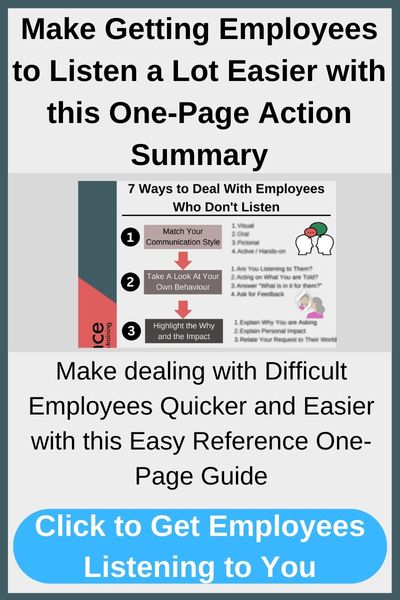7 ways to Deal with Employees who Don’t Listen

Having team members or employees not listening to you is so frustrating. Being ignored at work is never nice at the best of times and if you have to deal with employees who don’t listen it can knock your confidence, impact the team overall and can certainly create negative feelings that help no-one.
We share 7 ways to deal with employees who don’t listen. Try them all and put into practice what works best for you. Don’t forget that different approaches work better in different situations and with different people.
This Article Covers
- Match your communication style
- Take a look at your own behaviour
- Highlight the why and the impact
- Ask for a summary and input
- Ask them to make a decision
- Put what is agreed in writing and follow up
- Create consequences for the individual
Watch on YouTube
Listen on Podcast
Dealing with employees who don’t listen: Match Your Communication Style
We all take in information in different ways and have learning preferences. 4 different learning styles are:
- Visual – such as reading books
- Oral – being verbally told or using audio books
- Pictorial – looking at diagram, graphical information and similar
- Active or hands-on – you want to use your hands and just do it and experience it
And of course, we all have our preferred ways of communicating to others.
Think about how you are communicating to the team member who doesn’t listen to you and try out different communication styles. Match up the communication style that best gets the employee’s attention and gives them the best chance of taking in what you are telling them.
Flexing your style helps you get what you want and helps the team member who doesn’t listen properly.
Dealing with employees who ignore you: Take a look at your own behaviour
If you are being ignored at work or what you ask for or say is only getting lip service, take a look at your own behaviour.
Are you listening to the individuals and team members and taking in what you are being told? Are you acting on what you are being told in any visible way to the team? If you don’t listen to team members, why should they listen to you?
Another point to think about – who is going to benefit from what you are asking the team member to do? i.e. are you answering the “what is in it for them” question. If the tasks are going to benefit the team and company, then indirectly, this benefits the person in the team.
If you still don’t understand why the employee is ignoring what you say or team members don’t listen to you, then ask them for feedback. Ask them “Is there something you are trying to tell me that I haven’t taken in yet?” or “Is there something that I don’t understand, or I am missing – which is making your reluctant to undertake x?”
Look after your employees, listen to them and treat them with respect and you are much more likely to be listened to and treated with respect in return.

Dealing with employees who don’t listen: Highlight the why and the impact
When you are asking someone to do something – a colleague, a team member or any stakeholder then explain why you are asking them and explain the impact of doing or not doing the activity requested.
Not understanding the why or the impact can often lead to employees who don’t listen or not take in what you are asking.
Make sure your go through the why and the impact – on them personally, the team and the company. Try to frame your explanation in reference to what they do day to day and what they need to deliver day in day out. They will be able to relate to what you say much more easily as a result.
Explaining the why is a very effective step when you are not being listened to at work.
Dealing with employees who ignore you: Ask for a summary and input from them
When I have a team member who doesn’t listen, I love asking them questions and waiting for them to answer. This puts the spotlight on them and drives their engagement and interaction with you.
Ask questions like
- “Would you mind giving me a quick summary of how you will go about achieving this goal or task?”
- “Can you tell me how long it will take you do deliver each part of the project?”
- “How do you think this will benefit you, the team or the business?”
- “How should we approach solving this problem?”
- “What problems do you think we will encounter with this approach?”
Ask them questions that gets them thinking and requires them to tell you their views and ideas. Get them to provide a summary of what you have requested. If you consistently do this you won’t struggle with being ignored at work or having team members who don’t listen. [Click to get examples of exactly how to get employees to listen]

Dealing with employees who don’t listen: Ask them to make a decision
When you encounter team members who don’t listen or just don’t take in what you are saying, providing them several potential options and ask them to decide on their preferred option and to explain why they have chosen that one. You get to frame the potential solutions thereby providing direction, you get their input, and you get their buy in – because they are choosing the solution. You kill several birds with one approach.
To make a decision, the employees who don’t listen have to take in what you are saying, think about it and provide a reasoned decision. You will quickly find out how much they are listening to you or not.
Don’t let them get away with bland answers or giving you a choice without the reasoning behind it. If you allow them to get away with this the first time, you set the bad precedent. Don’t let them off the hook – make sure they give you a proper answer. And getting their input and ideas may well provide you with a better overall solution. And this helps everyone.
So be nice and be assertive –ask their opinion and for their decision on options you present to them. This is a great way to tackle employees who don’t listen.
Dealing with employees who ignore you: Put what is agreed in writing
Everything we take in is coloured by our reference points and hopes and fears. This is basic human behaviour. When something is agreed verbally, there will be differences in what exactly has been agreed in the minds of each party. Over time these differences will become bigger as some remember one thing and others something else.
Put the action points or the activity agreed and the goals in writing to the individual. This creates a fixed reference point for both parties to get common understanding and agreement – now and in the days and months to come.
It takes 5 minutes to put together and send an email. And you can print this off and bring what is agreed to your one-to-one meetings. By following up, you are reminding the employee what has been agreed and demonstrating its importance to you. This makes it important to the employee, if they want to keep you happy.
When you put deliverables into writing, you also have the groundwork to deal with underperforming employees. Take a look at our video on managing underperformers.
Dealing with employees who don’t listen: Create consequences
When you take employees through the why and the impact, you are outlining the consequences of inaction. By putting the deliverables into writing, you are again making the request more formal and creating a reference email or document. Most people understand how this could be used if they don’t do anything.
You can be more explicit if you are dealing with a difficult employee and spell out the consequences of not delivering against mutually agreed goals in reasonable timeframes or to reasonable quality levels. The consequences could be no bonus, a personal improvement plan or even asking the individual into a disciplinary process which could result in them losing their job.
For some, using a stick as well as carrots is necessary to motivate them into action.
In Summary
The seven ways we have gone through have all been tried and tested in many situations and with a huge range of people. They work best when you choose the right approach for the right person and right situation. They also work perfectly well put into practice with confidence and consideration.
Try out each of seven ways outlined. Get confident in using them and judging how best to use each.
Here are some examples of exactly how to get employees to listen to you

When an employee appears to not be listening on a regular basis, go through these actions to resolve the situation as quickly as possible.
Most employees want to do a good job, so there is usually underlying reasons why they are not listening – find out what these are and resolve them.
If you’ve found this article useful please share it on social media or with friends.









